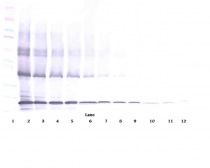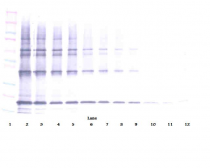ARG56752
anti-CD253 / TRAIL antibody (Biotin)
anti-CD253 / TRAIL antibody (Biotin) for ELISA,Western blot and Human,Rat
Overview
| Product Description | Biotin-conjugated Rabbit Polyclonal antibody recognizes CD253 / TRAIL |
|---|---|
| Tested Reactivity | Hu, Rat |
| Tested Application | ELISA, WB |
| Host | Rabbit |
| Clonality | Polyclonal |
| Isotype | IgG |
| Target Name | CD253 / TRAIL |
| Antigen Species | Human |
| Immunogen | E.coli derived Recombinant Human sTRAIL. (MRERGPQRVA AHITGTRGRS NTLSSPNSKN EKALGRKINS WESSRSGHSF LSNLHLRNGE LVIHEKGFYY IYSQTYFRFQ EEIKENTKND KQMVQYIYKY TSYPDPILLM KSARNSCWSK DAEYGLYSIY QGGIFELKEN DRIFVSVTNE HLIDMDHEAS FFGAFLVG) |
| Conjugation | Biotin |
| Alternate Names | TL2; CD253; Protein TRAIL; TNF-related apoptosis-inducing ligand; TRAIL; CD antigen CD253; Apo-2 ligand; Apo-2L; APO2L; Tumor necrosis factor ligand superfamily member 10 |
Application Instructions
| Application Suggestion |
|
||||||
|---|---|---|---|---|---|---|---|
| Application Note | * The dilutions indicate recommended starting dilutions and the optimal dilutions or concentrations should be determined by the scientist. |
Properties
| Form | Liquid |
|---|---|
| Purification | Purified by affinity chromatography. |
| Buffer | PBS (pH 7.2) |
| Concentration | 1 mg/ml |
| Storage Instruction | Aliquot and store in the dark at 2-8°C. Keep protected from prolonged exposure to light. Avoid repeated freeze/thaw cycles. Suggest spin the vial prior to opening. The antibody solution should be gently mixed before use. |
| Note | For laboratory research only, not for drug, diagnostic or other use. |
Bioinformation
| Database Links |
Swiss-port # P50591 Human Tumor necrosis factor ligand superfamily member 10 |
|---|---|
| Gene Symbol | TNFSF10 |
| Gene Full Name | tumor necrosis factor (ligand) superfamily, member 10 |
| Background | The protein encoded by this gene is a cytokine that belongs to the tumor necrosis factor (TNF) ligand family. This protein preferentially induces apoptosis in transformed and tumor cells, but does not appear to kill normal cells although it is expressed at a significant level in most normal tissues. This protein binds to several members of TNF receptor superfamily including TNFRSF10A/TRAILR1, TNFRSF10B/TRAILR2, TNFRSF10C/TRAILR3, TNFRSF10D/TRAILR4, and possibly also to TNFRSF11B/OPG. The activity of this protein may be modulated by binding to the decoy receptors TNFRSF10C/TRAILR3, TNFRSF10D/TRAILR4, and TNFRSF11B/OPG that cannot induce apoptosis. The binding of this protein to its receptors has been shown to trigger the activation of MAPK8/JNK, caspase 8, and caspase 3. Alternatively spliced transcript variants encoding different isoforms have been found for this gene. [provided by RefSeq, Jul 2010] |
| Function | Cytokine that binds to TNFRSF10A/TRAILR1, TNFRSF10B/TRAILR2, TNFRSF10C/TRAILR3, TNFRSF10D/TRAILR4 and possibly also to TNFRSF11B/OPG. Induces apoptosis. Its activity may be modulated by binding to the decoy receptors TNFRSF10C/TRAILR3, TNFRSF10D/TRAILR4 and TNFRSF11B/OPG that cannot induce apoptosis. [UniProt] |
| Calculated MW | 33 kDa |
| PTM | Tyrosine phosphorylated by PKDCC/VLK. |
Images (4) Click the Picture to Zoom In
-
ARG56752 anti-CD253 / TRAIL antibody (Biotin) WB image
Western blot: 250 - 0.24 ng of Human sTRAIL/Apo2L stained with ARG56752 anti-CD253 / TRAIL antibody (Biotin), under reducing conditions.
-
ARG56752 anti-CD253 / TRAIL antibody (Biotin) standard curve image
Direct ELISA: ARG56752 anti-CD253 / TRAIL antibody (Biotin) at 0.25 - 1.0 µg/ml results of a typical standard run with optical density.
-
ARG56752 anti-CD253 / TRAIL antibody (Biotin) WB image
Western blot: 250 - 0.24 ng of Human sTRAIL/Apo2L stained with ARG56752 anti-CD253 / TRAIL antibody (Biotin), under non-reducing conditions.
-
ARG56752 anti-CD253 / TRAIL antibody (Biotin) standard curve image
Sandwich ELISA: ARG56752 anti-CD253 / TRAIL antibody (Biotin) as a detection antibody at 0.25 - 1.0 µg/ml combined with ARG56642 anti-CD253 / TRAIL antibody as a capture antibody. Results of a typical standard run with optical density.









